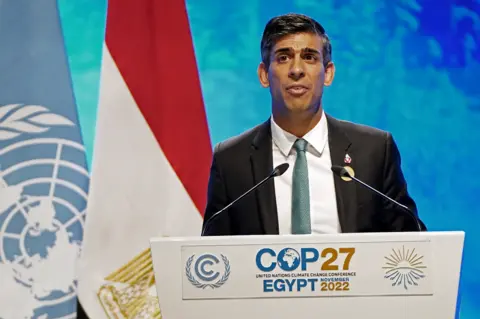Memo reveals pressure on UK climate finance pledge
 Getty Images
Getty ImagesThe government looks set to break its flagship £11.6bn climate and nature funding pledge for developing countries, an internal government document seen by the BBC says.
The document details how the government has consistently underspent and would now struggle to meet its 2026 target.
Some 83% of the total overseas aid budget would need to be reallocated to climate to catch up, it adds.
The government says it will honour promises made on climate finance.
"The government remains committed to spending £11.6bn on international climate finance and we are delivering on that pledge," a government spokesperson said.
Former Prime Minister Boris Johnson pledged in 2019 to double the amount spent on the UK's international climate finance (ICF) - aid for vulnerable nations to deal with the causes of climate change - to at least £11.6bn between 2021/22 and 2025/26.
But the document says "subsequent turbulence" - referring to economic shocks such as the Covid pandemic - "has turned a stretching target into a huge challenge".
Overall international aid spending has also since been cut to 0.5% of GDP, down from 0.7%.
Civil servants have calculated the government is now so behind on its spending promises it would have to spend 83% of the total foreign aid budget on climate to meet the ICF target by 2026.
That would require a "reorientation" of the budget on a scale which has "not previously been achieved", they say.
Doing so would also mean that there would be no cash left for other priorities such as projects "specifically targeted at helping women and girls", civil servants write.
The revelations follows Tory peer Lord Zac Goldsmith's resignation from Rishi Sunak's government last week over what he described as the prime minister's "apathy" towards climate change.
Lord Goldsmith has told the BBC that in his view, the low levels of expenditure so far combined with the decision to define our spending on Afghan and Ukrainian refugees here in the UK - something he says other countries have not done - means "it is going to be virtually impossible to honour the promise."
"Whoever is in government after the next election", he said, "would have to savagely slash humanitarian, education, health and other funding in order to hit the £11.6bn target."
Lord Goldsmith said he was worried that small island states in particular "will be left feeling utterly betrayed" and said the UK's reputation as a "reliable partner" will "simply be shredded".
That is a view that is echoed by many in the overseas aid community.
"Frankly it is embarrassing", a director of one UK aid agency told the BBC. "The cuts make it supremely difficult to credibly state the UK remains a climate change thought leader."
"There used to a be a huge amount of goodwill across Africa for the UK", he continued. "We were seen as the best in the sector, engaged and effective. This is no longer the case. The UK is now seen as an unreliable partner."
Mr Sunak insisted Lord Goldsmith had quit after being asked to apologise for comments he made about the Privileges Committee inquiry over the conduct of Boris Johnson and whether he had intentionally misled the House of Commons as PM.
But Lord Goldsmith denied this, instead saying his decision to step down had been a "long time coming".
The ICF refers to UK aid given to support vulnerable countries to deal with the causes of climate change, including preventing deforestation and reducing carbon emissions, as well as preparing for its effects.
It forms a part of the global commitment to spend $100bn a year on climate finance for developing countries.
